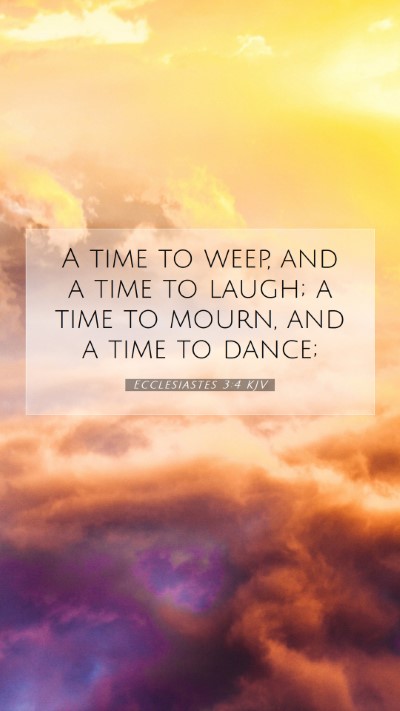Understanding Ecclesiastes 3:4
Bible Verse: Ecclesiastes 3:4 - "A time to weep, and a time to laugh; a time to mourn, and a time to dance."
Interpretation and Meaning of Ecclesiastes 3:4
This verse from Ecclesiastes highlights the natural rhythm of life, acknowledging that there are appropriate times for various emotional responses. The author, traditionally known as Solomon, suggests that life is marked by fluctuating circumstances and that one's emotional state should correspond to these changes.
Key Themes and Insights
- Emotional Spectrum: Life comprises both sorrow and joy. This verse illustrates that both emotions are vital parts of the human experience.
- Divine Order: The verse reflects the belief that God has a time for every season in our lives, reinforcing the idea that He orchestrates the events of our existence.
- Appropriateness of Actions: It implies that there is wisdom in recognizing when to express different emotions—sometimes we should weep, and at other times, we should rejoice.
Commentary Insights
According to Matthew Henry, this verse signifies the balance God provides in our emotional experiences. He points out that both laughter and weeping serve unique purposes in the human condition, whether that’s to heal, teach, or bring people together.
Albert Barnes emphasizes that this verse serves as a reminder that life is not static. He interprets the contrasting actions of weeping and laughing as symbolic of life's changing seasons. Just as we experience joy and laughter, we also face seasons of mourning and sorrow, each having its purpose in the divine plan.
Furthermore, Adam Clarke underscores that this verse illustrates God's timing in our lives. He highlights that we are to understand and accept these different times and to respond appropriately to them, reflecting wisdom and humility in the face of life’s ups and downs.
Practical Applications
For readers seeking Bible verse explanations, the message of Ecclesiastes 3:4 can apply to daily life in several significant ways:
- Emotional Awareness: Recognize your current emotional state and the season you are in; whether it's a time of grieving or a time for celebration.
- Support for Others: Offer compassion and support to those mourning while also joining in joy when others are celebrating.
- Acceptance of Change: Embrace the idea that change is a natural and necessary part of life, and it comes from a divine source.
Cross References
- Psalm 30:5: "For his anger lasts only a moment, but his favor lasts a lifetime; weeping may stay for the night, but rejoicing comes in the morning."
- Romans 12:15: "Rejoice with those who rejoice; mourn with those who mourn."
- Isaiah 61:3: "And provide for those who grieve in Zion—to bestow on them a crown of beauty instead of ashes, the oil of joy instead of mourning, and a garment of praise instead of a spirit of despair."
Conclusion
In conclusion, Ecclesiastes 3:4 encapsulates the duality of human experience, providing profound Bible study insights for understanding life's varying seasons. Grasping the meaning of this verse invites believers to reflect on the divine timing in their lives, recognize the importance of all emotional experiences, and approach each situation with wisdom.


